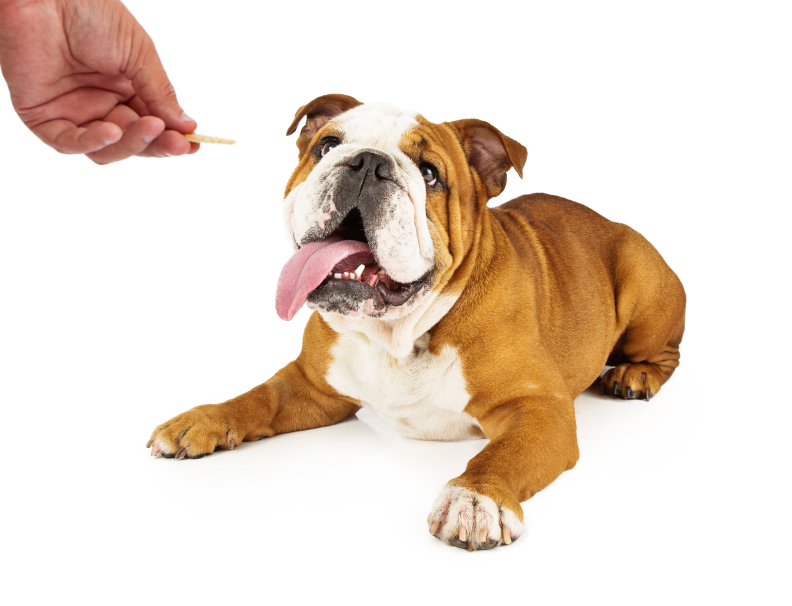The fly-biting syndrome in Bulldogs is a condition where in a dog appears to be snapping at non-existent flies or insects. Dogs who show this behavior are reported to be watching something near his face before suddenly biting or snapping at it. Studies indicate the possibility of various reasons, including behavior issues, partial seizure, canine epilepsy, and visual disturbances, underlining such behavior in your pet.

While snapping at flies is a common compulsive behavior dogs display sporadically, it could be concerning to see your pet doing it frequently and that too in the absence of any fly. Moreover, the fly-biting syndrome in Bulldogs may result in potential injuries when it continues for a long period of time and becomes an obsessive disorder.
Possible Causes of Fly-Biting Syndrome in Bulldogs
Even veterinarians and dog behavior experts cannot pinpoint the exact cause of snapping so this condition. The fly-biting syndrome in Bulldogs may occur suddenly, and it is generally labeled as an idiopathic disorder. However, studies show that the following factors contribute to the problem in dogs.
Eye Problems
Just like in humans, dogs’ eyes are filled with fluid. Sometimes, little chunks of deposits or condensation can be present in the fluid. These are called “vitreous floaters.” Many veterinarians opine that these eye floaters lead to a dogs’ random snapping at invisible flies.
Often a dog mistakes vitreous floaters appearing as spots to him as flies and snap at. Even minuscule debris in the eye fluid also causes a dog to see spots before his eyes and forcing him to do fly snapping.
Get your dog checked by a vet or dog ophthalmologist to rules out the cause.
Partial Seizures
The fly-biting syndrome in Bulldogs may also occur due to epileptic seizure. Hallucinations are possible indicators of epilepsy in humans and dogs too have them. This leads them to visualize as if a fly or something similar present before their eyes. As a result, your pet may try snapping at the hallucinated object.
However, it is difficult to verify if hallucination is the exact cause of the fly-biting syndrome. We cannot ask Bulldogs what they see or feel. Recording brain waves with an EEG during an episode of fly-biting is very hard to do because dogs aren’t comfortable with having electrodes stuck on their heads.
No one knows when a fly-biting episode will happen. So even a dog is trained to sit still with electrodes stuck on his head, it is unlikely that the dog will stay put with them on for hours until the fly-biting episode occurs.
Gastrointestinal Problems
According to a dog study by researchers at the University of Montreal Veterinary Teaching Hospital, gastrointestinal problems may be a factor in inducing the fly-biting syndrome. For this study, researchers evaluated seven fly-biting dogs to characterize the fly-biting syndrome. All subjects underwent complete health scrutiny to examine if the cause was due to the presence of a medical problem.
Surprisingly, all the seven dogs studied had some type gastrointestinal issues, such as
- inflammation of the GI tract
- gastro-esophageal reflux
- delayed emptying of food from the stomach
- flaccid and distended stomach
After receiving treatment for their GI problems, the fly-biting behavior was resolved in four cases. Two of them did not have fly-biting recurrence two checkups in the next 90 days following the treatment. Unfortunately, the two other dogs were not able to have their follow up evaluation because one had to be put down due to a degenerative joint disorder, while the other one encountered an accident and died.
One of the seven dogs was also diagnosed with Chiari malformation, a neurological disorder affecting the brain signals. The said dog responded to a medication used to treat seizures and nerve pain but not to GI treatment. Another dog showed a decrease in fly biting. The owners of the last dog were not able to follow the recommended diet and treatment so the fly-biting behavior remained.
Fly-Biting Syndrome in Bulldogs: What To Do, How To Care
If your Bulldog has visible signs of the fly-biting syndrome, you should get his health assessed. In case your pet is suffering from any health problem, make sure he is treated well for that specific disorder. Check if his fly-biting behavior is on the wane or resolved following the treatment.
Short occurrences of fly biting do not really harm your Bulldog. But if this behavior is visible over a longer period of time, your pet may strain his neck or experience other physiological issues. So, during your dog’s fly-biting moments, try distracting him by calling or petting him.
Using mental and physical exercises to keep your dog busy may also help prevent the fly-biting syndrome in Bulldogs.

